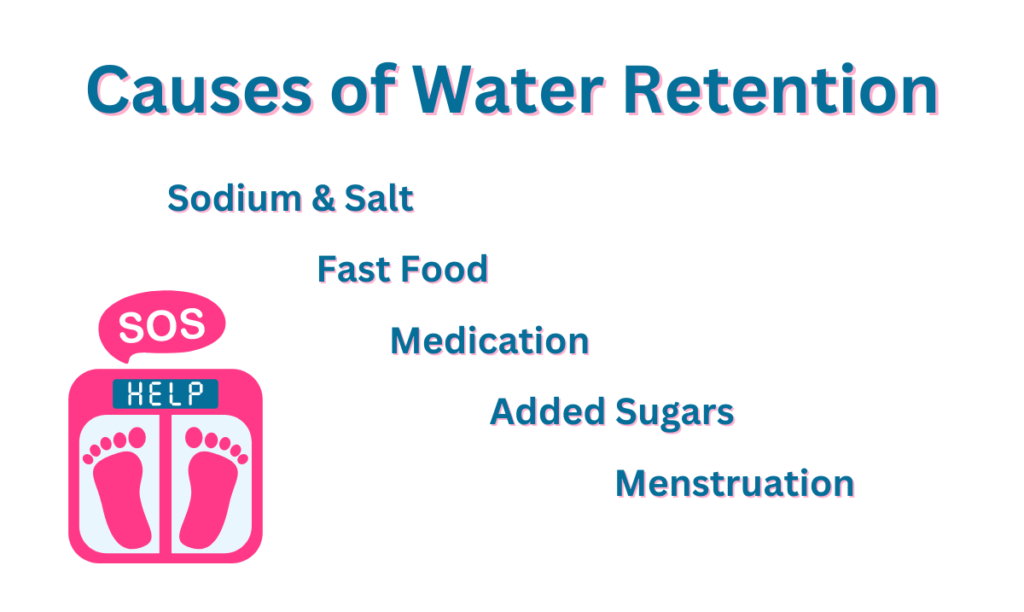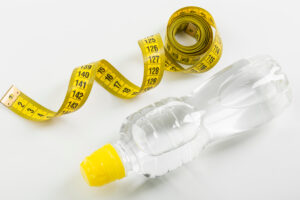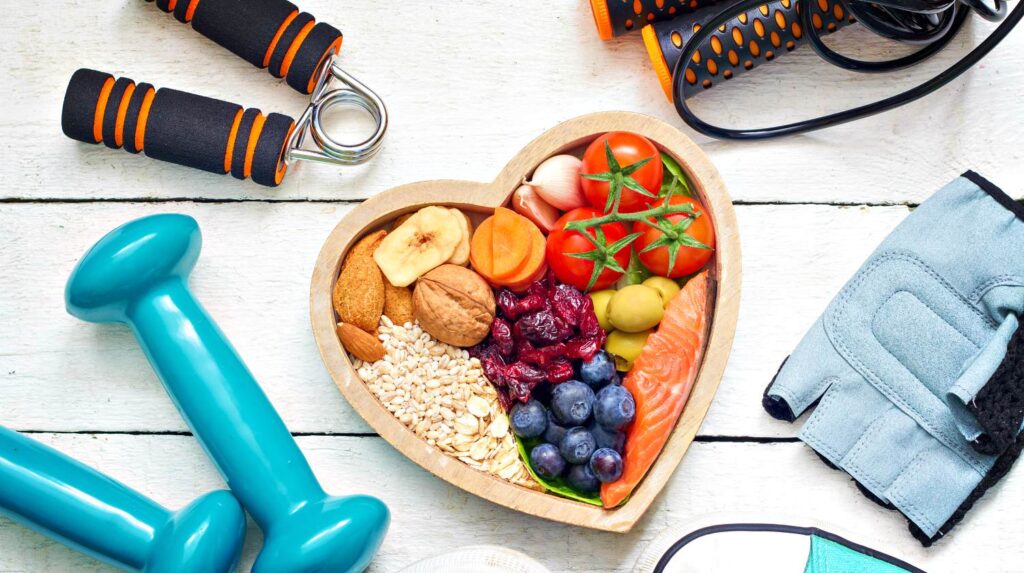My macro coaching clients often send me frantic messages saying they are upset because it seems like they gained two pounds overnight. I reassure them that such dramatic weight fluctuations are caused by water retention rather than fat tissue increase.

Here is why the gain is usually weight retention:
It takes approximately 3500 extra calories beyond one’s TDEE (total daily energy expenditure) to create a pound of stored fat. To gain two pounds of fat overnight, one must eat an additional 7,000 calories beyond their TDEE. That is a lot of food.
What causes weight fluctuations of 1 to 3 pounds? Water retention is the main cause.
One pound of water is 15.34 ounces (450 ml) and 1 liter of excess water weighs more than 2 pounds.
Common Causes of Water Retention
1. Salt
When you eat too much salt, the cells of your body must compensate by absorbing more water to balance out sodium concentrations.
400 milligrams of sodium, the amount in a single gram of table salt, causes your body to retain an extra 4 cups of water, which equals roughly 2 pounds.
When you hear people say that “eating fast food made them gain weight overnight” this is what is happening. Fast food and processed food can be very high in sodium and causes weight fluctuations of 2 pounds or more when eaten.
How long do you retain water after eating salt?
Most of the time, it takes a couple of days of normal sodium intake for your body to get rid of extra sodium through urine or sweat. You can speed it up by drinking more water and working out hard enough to make you sweat.
2. Medication
Even common drugs like ibuprofen can cause water retention. If you take NSAIDs like Advil, Aleve, or aspirin to help your body recover from exercise, you may retain water.
You can get a good idea of your progress if you weigh yourself without these drugs in your body. Common NSAIDs include:
- Ibuprofen
- Naproxen
- Aspirin
- Acetaminophen
- Celecoxib
- Diclofenac
- Indomethacin
- Ketoprofen
- Meloxicam
- Piroxicam
How long do you retain water after taking medications?
There is really no definitive answer to this question as it depends on the individual and the dosage of NSAIDs taken. Generally, NSAIDs are excreted from the body within 24 hours.
3. Menstruation
Bloating and water retention are frequent in the days leading up to a woman’s period. This is due in part to estrogen levels fluctuating throughout a woman’s menstrual cycle: during ovulation, when estrogen levels are highest, salt binds with the kidneys’ cells more easily than usual; this leads to more fluid being retained in the body overall.
It’s normal to gain water weight during this time, so don’t get upset if you don’t see any weight loss or notice that you’ve gained weight quickly.
How long do you retain water during your period?
This water retention lasts about a week in all.
It’s probably best to avoid weigh-ins during this time of the month.
4. Strength Training & Exercise
You may be sticking to your weight loss macros and working out hard, but you may be 2-3 pounds heavier after a workout. This is normal!
When you stress your muscle tissue, the body responds by filling the tissue with fluid. This is why after you work out your muscles appear larger or “pumped up.” Unfortunately, the size is just temporary.
How long do you retain water post-workout?
Most people are safe to weigh in the next morning but if you had a really hard workout and feel sore, it may take two days for the inflammation to subside.
Please never weigh yourself after your workout as this is not a way to accurately track your progress.
5. Refined Carbs & Fiber
Refined carbs or simple carbs like added sugar, bleached flour, and other processed foods can increase insulin levels in the body. Insulin increases the re-absorption of sodium in the kidneys, leading to increased fluid volume. Some people think that when they eat a candy bar they automatically gain one or two pounds overnight. This is a myth. All the sugar in the candy bar is the true culprit and the weight gain is from water retention, not fat gain.
Of course, if the candy bar is causing you to exceed your TDEE, then it will lead to fat gain.
High fiber diets also cause water weight gain as fiber absorbs water in your intestines. Think of the way oatmeal rice swells up when left in water. This same thing happens in your gut. This is why it’s always best to weigh in after you have a bowel movement.
How to Prevent Water Weight and Water Retention
Some water retention (edema) is unavoidable, especially if you are a woman or lift weights.
However, we can make changes to our lives that will greatly reduce the amount of water retention or water weight changes.
1. Manage salt intake
The number one way to cut water retention is to watch your salt intake. Adults should limit their sodium intake to 2300 mg (1 teaspoon) or less, according to 2015-2023 Dietary Guidelines. Daily exercisers might consume more if they get enough potassium. Non-exercisers need less than 2300 mg. If you are tracking your macros using an app like MyFitnessPal you can also see sodium intake.
If you notice a drastic weight fluctuation, just look at your app and I bet you that your prior days sodium intake was higher than normal.
2. Drink more water (seems counter intuitive)
Drinking more water helps remove salt from the body. Osmosis is the process of transferring solutions across a semi-permeable membrane. When you drink more water, this causes the excess salt to diffuse out of your cells and it can then be flushed away by your kidneys and skin. Working up a good sweat aids the body’s sodium removal process. Exercise vigorously and drink plenty of water to counterbalance the salty things you eat.
Remember it’s not the water that’s causing the weight gain. Always keep yourself well hydrated.
3. Other water retention culprits
Pregnancy, breastfeeding, over-consumption of alcohol, and certain medications and medical conditions can all affect fluid balance in the body.
Don’t allow water weight gain to make you frustrated and quit
Rest assured that anytime you see your weight shoot up overnight, or over a couple of days, this is a water weight issue; not a fat gain issue.


 Tracking Macros When Eating Out
Tracking Macros When Eating Out
